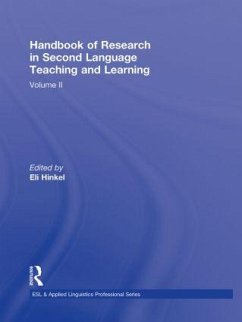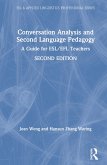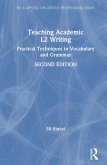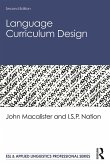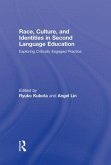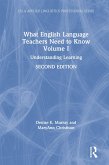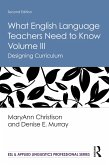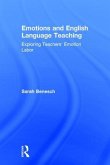Handbook of Research in Second Language Teaching and Learning
Volume 2
Herausgeber: Hinkel, Eli
Handbook of Research in Second Language Teaching and Learning
Volume 2
Herausgeber: Hinkel, Eli
- Gebundenes Buch
- Merkliste
- Auf die Merkliste
- Bewerten Bewerten
- Teilen
- Produkt teilen
- Produkterinnerung
- Produkterinnerung
This landmark volume provides a broad-based, comprehensive, state-of-the-art overview of current knowledge and research into second language teaching and learning. All authors are leading authorities in their areas of expertise. The chapters, all completely new for Volume 2, are organized in eight thematic sections: Social Contexts in Research on Second Language Teaching and Learning Second Language Research Methods Second Language Research and Applied Linguistics Research in Second Language Processes and Development Methods and Instruction in Second Language Teaching Second Language…mehr
Andere Kunden interessierten sich auch für
![Conversation Analysis and Second Language Pedagogy Conversation Analysis and Second Language Pedagogy]() Jean WongConversation Analysis and Second Language Pedagogy185,99 €
Jean WongConversation Analysis and Second Language Pedagogy185,99 €![Teaching Academic L2 Writing Teaching Academic L2 Writing]() Eli HinkelTeaching Academic L2 Writing175,99 €
Eli HinkelTeaching Academic L2 Writing175,99 €![Language Curriculum Design Language Curriculum Design]() John MacalisterLanguage Curriculum Design184,99 €
John MacalisterLanguage Curriculum Design184,99 €![Race, Culture, and Identities in Second Language Education Race, Culture, and Identities in Second Language Education]() Race, Culture, and Identities in Second Language Education239,99 €
Race, Culture, and Identities in Second Language Education239,99 €![What English Language Teachers Need to Know Volume I What English Language Teachers Need to Know Volume I]() Denise E. MurrayWhat English Language Teachers Need to Know Volume I186,99 €
Denise E. MurrayWhat English Language Teachers Need to Know Volume I186,99 €![What English Language Teachers Need to Know Volume III What English Language Teachers Need to Know Volume III]() Maryann ChristisonWhat English Language Teachers Need to Know Volume III187,99 €
Maryann ChristisonWhat English Language Teachers Need to Know Volume III187,99 €![Emotions and English Language Teaching Emotions and English Language Teaching]() Sarah BeneschEmotions and English Language Teaching196,99 €
Sarah BeneschEmotions and English Language Teaching196,99 €-
-
-
This landmark volume provides a broad-based, comprehensive, state-of-the-art overview of current knowledge and research into second language teaching and learning. All authors are leading authorities in their areas of expertise. The chapters, all completely new for Volume 2, are organized in eight thematic sections: Social Contexts in Research on Second Language Teaching and Learning Second Language Research Methods Second Language Research and Applied Linguistics Research in Second Language Processes and Development Methods and Instruction in Second Language Teaching Second Language Assessment Ideology, Identity, Culture, and Critical Pedagogy in Second Language Teaching and Learning Language Planning and Policy. Changes in Volume 2: captures new and ongoing developments, research, and trends in the field surveys prominent areas of research that were not covered in Volume 1 includes new authors from Asia, Australia, Europe, and North America to broaden the Handbook's international scope. Volume 2 is an essential resource for researchers, faculty, teachers, and students in MA-TESL and applied linguistics programs, as well as curriculum and material developers.
Hinweis: Dieser Artikel kann nur an eine deutsche Lieferadresse ausgeliefert werden.
Hinweis: Dieser Artikel kann nur an eine deutsche Lieferadresse ausgeliefert werden.
Produktdetails
- Produktdetails
- Verlag: Routledge
- Seitenzahl: 1018
- Erscheinungstermin: 18. Januar 2011
- Englisch
- Abmessung: 260mm x 183mm x 58mm
- Gewicht: 2069g
- ISBN-13: 9780415998710
- ISBN-10: 0415998719
- Artikelnr.: 30881931
- Verlag: Routledge
- Seitenzahl: 1018
- Erscheinungstermin: 18. Januar 2011
- Englisch
- Abmessung: 260mm x 183mm x 58mm
- Gewicht: 2069g
- ISBN-13: 9780415998710
- ISBN-10: 0415998719
- Artikelnr.: 30881931
Eli Hinkel, Professor, Seattle University, has taught ESL and applied linguistics, as well as trained teachers, for more than 30 years.
Preface
Part I. Social Contexts in Research on Second Language Teaching and
Learning
1. Dual Language Education Donna Christian, Center for Applied Linguistics
2. Teacher Education and Teacher Development Amy B. M. Tsui, University of
Hong Kong
3. Learning to Write in The Second Language: K-5 María Estela Brisk, Boston
College
4. Social Practice and Register: Language as a Means of Learning Bernard
Mohan, University of British Columbia (Emeritus)
5. Vocational ESL Denise Murray, Macquarie University
6. English for Academic Purposes Liz Hamp-Lyons, University of Hong Kong
7. Research in English for Specific Purposes Brian Paltridge, University of
Sydney, and Sue Starfield, University of New South Wales
8. English as an International Lingua Franca Pedagogy Sandra McKay, San
Francisco State University
9. Teaching English as a Foreign Language in Europe Vivian Cook, Newcastle
University
10. World Englishes: Contexts and Relevance for Language Education Yamuna
Kachru, University of Illinois, Urbana-Champaign (Emerita)
Part II. Second Language Research Methods
11. Approaches and Methods in Recent Qualitative Research Linda Harklau,
University of Georgia
12. Quantitative Research in Second Language Studies James Dean Brown,
University of Hawai'i at M¿noa
13. Case Study Keith Richards, University of Warwick
14. Shifting Sands: The Evolving Story of "Voice" in Qualitative Research
David Nunan, University of Hong Kong/Anaheim University, and Julie Choi,
University of Technology, Sydney
15. Action Research in the Field of Second Language Teaching and Learning
Anne Burns, Macquarie University
Part III. Second Language Research and Applied Linguistics
16. Second Language Acquisition Research: Applied and Applicable
Orientations to Practical Questions and Concerns Teresa Pica, University of
Pennsylvania
17. Constrained But Not Determined: Approaches to Discourse Analysis
Sandra Silberstein, University of Washington
18. Language Socialization in Multilingual and Second Language Contexts
Robert Bayley, University of California, Davis, and Juliet Langman,
University of Texas, San Antonio
19. Integrating Sociocultural Theory and Cognitive Linguistics in the
Second Language Classroom James P. Lantolf, Pennsylvania State University
20. Second Language Pragmatics Virginia LoCastro, University of Florida
21. Conversation Analytic Research into Language Teaching and Learning
Paul Seedhouse, Newcastle University
22. What Corpora Can Offer in Language Teaching and Learning Tony McEnery,
Lancaster University, and Richard Xiao, Edge Hill University
Part IV. Research in Second Language Processes and Development
23. Language Learning: An Ecological -- Semiotic Approach Leo van Lier,
Monterey Institute of International Studies
24. Cognitive Aptitudes for Second Language Learning Robert DeKeyser and
Joel Koeth, University of Maryland
25. Around and beyond the Critical Period Hypothesis David Singleton,
Trinity College, Dublin, and Carmen Muñoz, University of Barcelona
26. Interactional Competence in Language Learning, Teaching, and Testing
Richard Young, University of Wisconsin
27. Second Language Speaking Paul Nation, Victoria University of Wellington
28. Second Language Listening: Presage, Process, Product, and Pedagogy
Larry Vandergrift, University of Ottawa
29. Second language literacy Lee Gunderson, Dennis Murphy Odo, and Reginald
D'Silva, University of British Columbia
30. Out of my Orthographic Depth: Second Language Reading Barbara Birch,
California State University, Fresno
31. Grammar Teaching: Research, Theory, and Practice Penny Ur, Oranim
Academic College of Education
32. What Research on Second Language Writing Tells Us and What it Doesn't
Eli Hinkel, Seattle University
Part V. Methods and Instruction in Second Language Teaching
33. Communicative Language Teaching: An Expanding Concept for a Changing
World William Littlewood, Hong Kong Institute of Education
34. Re-Evaluating Traditional Approaches to Second Language Teaching and
Learning Lixian Jin, De Montfort University, and Martin Cortazzi,
University of Warwick
35. Focus-on-Form Instruction Shawn Loewen, Michigan State University
36. Corrective Feedback in Language Teaching Rod Ellis, University of
Auckland, and Younghee Sheen, American University, Washington, D.C.
37. Content-Based Second Language Teaching Roy Lyster, McGill University
38. Content-based Instruction and Vocabulary Learning Paul Nation and
Stuart Webb, Victoria University of Wellington
39. Written Discourse Analysis and Second Language Teaching Dana Ferris,
University of California, Davis
40. Computer-Assisted Language Learning Dorothy Chun, University of
California, Santa Barbara
41. Second Language Learner Strategies Andrew Cohen, University of
Minnesota
Part VI. Second Language Assessment
Guest Editor: Carol Chapelle, Iowa State University
Introduction, Carol Chapelle, Iowa State University
42. How Language Ability Is Assessed Rob Schoonen, University of Amsterdam
43. Validation in Language Assessment Carol Chapelle, Iowa State University
44. Quantitative Research Methods in Assessment and Testing James E.
Purpura, Teachers College, Columbia University
45. Qualitative Research Methods in Second Language Assessment Bernard
Mohan, University of British Columbia (Emeritus)
46. Assessment of Classroom Language Learning Joan Jamieson, Northern
Arizona University
47. The Social and Political Tensions of Language Assessment Steven Ross,
University of Maryland, College Park
Part VII. Ideology, Identity, Culture, and Critical Pedagogy in Second
Language Teaching and Learning
48. Ideology in Second Language Education James Tollefson, University of
Washington (Emeritus)
49. Identity in Second Language Teaching and Learning Brian Morgan, York
University, and Matthew Clarke, University of New South Wales
50. Language Teaching and Learning from an Intercultural Perspective
Anthony Liddicoat, University of South Australia
51. Critical Literacy and Second Language Learning Allan Luke and Karen
Dooley, Queensland University of Technology
Part VIII. Language Planning and Policy
Guest Editor: Richard Baldauf, Jr., University of Queensland
52. The History and Theory of Language Planning Jiri Nekvapil, Charles
University
53. Language Planning: Approaches and Methods Nkonko Kamwangamalu, Howard
University
54. Actors in Language Planning Shouhui Zhao, National Institute of
Education, Nanyang Technological University
55. Macro Language Planning Robert B. Kaplan, University of Southern
California (Emeritus)
56. Micro Language Planning Catherine Chua, National Institute of
Education, Nanyang Technological University, and Richard B. Baldauf Jr,
University of Queensland
57. Global Language [De]Colonization in the New Era Catherine Chua,
National Institute of Education, Nanyang Technological University, and
Richard B. Baldauf Jr, University of Queensland
Part I. Social Contexts in Research on Second Language Teaching and
Learning
1. Dual Language Education Donna Christian, Center for Applied Linguistics
2. Teacher Education and Teacher Development Amy B. M. Tsui, University of
Hong Kong
3. Learning to Write in The Second Language: K-5 María Estela Brisk, Boston
College
4. Social Practice and Register: Language as a Means of Learning Bernard
Mohan, University of British Columbia (Emeritus)
5. Vocational ESL Denise Murray, Macquarie University
6. English for Academic Purposes Liz Hamp-Lyons, University of Hong Kong
7. Research in English for Specific Purposes Brian Paltridge, University of
Sydney, and Sue Starfield, University of New South Wales
8. English as an International Lingua Franca Pedagogy Sandra McKay, San
Francisco State University
9. Teaching English as a Foreign Language in Europe Vivian Cook, Newcastle
University
10. World Englishes: Contexts and Relevance for Language Education Yamuna
Kachru, University of Illinois, Urbana-Champaign (Emerita)
Part II. Second Language Research Methods
11. Approaches and Methods in Recent Qualitative Research Linda Harklau,
University of Georgia
12. Quantitative Research in Second Language Studies James Dean Brown,
University of Hawai'i at M¿noa
13. Case Study Keith Richards, University of Warwick
14. Shifting Sands: The Evolving Story of "Voice" in Qualitative Research
David Nunan, University of Hong Kong/Anaheim University, and Julie Choi,
University of Technology, Sydney
15. Action Research in the Field of Second Language Teaching and Learning
Anne Burns, Macquarie University
Part III. Second Language Research and Applied Linguistics
16. Second Language Acquisition Research: Applied and Applicable
Orientations to Practical Questions and Concerns Teresa Pica, University of
Pennsylvania
17. Constrained But Not Determined: Approaches to Discourse Analysis
Sandra Silberstein, University of Washington
18. Language Socialization in Multilingual and Second Language Contexts
Robert Bayley, University of California, Davis, and Juliet Langman,
University of Texas, San Antonio
19. Integrating Sociocultural Theory and Cognitive Linguistics in the
Second Language Classroom James P. Lantolf, Pennsylvania State University
20. Second Language Pragmatics Virginia LoCastro, University of Florida
21. Conversation Analytic Research into Language Teaching and Learning
Paul Seedhouse, Newcastle University
22. What Corpora Can Offer in Language Teaching and Learning Tony McEnery,
Lancaster University, and Richard Xiao, Edge Hill University
Part IV. Research in Second Language Processes and Development
23. Language Learning: An Ecological -- Semiotic Approach Leo van Lier,
Monterey Institute of International Studies
24. Cognitive Aptitudes for Second Language Learning Robert DeKeyser and
Joel Koeth, University of Maryland
25. Around and beyond the Critical Period Hypothesis David Singleton,
Trinity College, Dublin, and Carmen Muñoz, University of Barcelona
26. Interactional Competence in Language Learning, Teaching, and Testing
Richard Young, University of Wisconsin
27. Second Language Speaking Paul Nation, Victoria University of Wellington
28. Second Language Listening: Presage, Process, Product, and Pedagogy
Larry Vandergrift, University of Ottawa
29. Second language literacy Lee Gunderson, Dennis Murphy Odo, and Reginald
D'Silva, University of British Columbia
30. Out of my Orthographic Depth: Second Language Reading Barbara Birch,
California State University, Fresno
31. Grammar Teaching: Research, Theory, and Practice Penny Ur, Oranim
Academic College of Education
32. What Research on Second Language Writing Tells Us and What it Doesn't
Eli Hinkel, Seattle University
Part V. Methods and Instruction in Second Language Teaching
33. Communicative Language Teaching: An Expanding Concept for a Changing
World William Littlewood, Hong Kong Institute of Education
34. Re-Evaluating Traditional Approaches to Second Language Teaching and
Learning Lixian Jin, De Montfort University, and Martin Cortazzi,
University of Warwick
35. Focus-on-Form Instruction Shawn Loewen, Michigan State University
36. Corrective Feedback in Language Teaching Rod Ellis, University of
Auckland, and Younghee Sheen, American University, Washington, D.C.
37. Content-Based Second Language Teaching Roy Lyster, McGill University
38. Content-based Instruction and Vocabulary Learning Paul Nation and
Stuart Webb, Victoria University of Wellington
39. Written Discourse Analysis and Second Language Teaching Dana Ferris,
University of California, Davis
40. Computer-Assisted Language Learning Dorothy Chun, University of
California, Santa Barbara
41. Second Language Learner Strategies Andrew Cohen, University of
Minnesota
Part VI. Second Language Assessment
Guest Editor: Carol Chapelle, Iowa State University
Introduction, Carol Chapelle, Iowa State University
42. How Language Ability Is Assessed Rob Schoonen, University of Amsterdam
43. Validation in Language Assessment Carol Chapelle, Iowa State University
44. Quantitative Research Methods in Assessment and Testing James E.
Purpura, Teachers College, Columbia University
45. Qualitative Research Methods in Second Language Assessment Bernard
Mohan, University of British Columbia (Emeritus)
46. Assessment of Classroom Language Learning Joan Jamieson, Northern
Arizona University
47. The Social and Political Tensions of Language Assessment Steven Ross,
University of Maryland, College Park
Part VII. Ideology, Identity, Culture, and Critical Pedagogy in Second
Language Teaching and Learning
48. Ideology in Second Language Education James Tollefson, University of
Washington (Emeritus)
49. Identity in Second Language Teaching and Learning Brian Morgan, York
University, and Matthew Clarke, University of New South Wales
50. Language Teaching and Learning from an Intercultural Perspective
Anthony Liddicoat, University of South Australia
51. Critical Literacy and Second Language Learning Allan Luke and Karen
Dooley, Queensland University of Technology
Part VIII. Language Planning and Policy
Guest Editor: Richard Baldauf, Jr., University of Queensland
52. The History and Theory of Language Planning Jiri Nekvapil, Charles
University
53. Language Planning: Approaches and Methods Nkonko Kamwangamalu, Howard
University
54. Actors in Language Planning Shouhui Zhao, National Institute of
Education, Nanyang Technological University
55. Macro Language Planning Robert B. Kaplan, University of Southern
California (Emeritus)
56. Micro Language Planning Catherine Chua, National Institute of
Education, Nanyang Technological University, and Richard B. Baldauf Jr,
University of Queensland
57. Global Language [De]Colonization in the New Era Catherine Chua,
National Institute of Education, Nanyang Technological University, and
Richard B. Baldauf Jr, University of Queensland
Preface
Part I. Social Contexts in Research on Second Language Teaching and
Learning
1. Dual Language Education Donna Christian, Center for Applied Linguistics
2. Teacher Education and Teacher Development Amy B. M. Tsui, University of
Hong Kong
3. Learning to Write in The Second Language: K-5 María Estela Brisk, Boston
College
4. Social Practice and Register: Language as a Means of Learning Bernard
Mohan, University of British Columbia (Emeritus)
5. Vocational ESL Denise Murray, Macquarie University
6. English for Academic Purposes Liz Hamp-Lyons, University of Hong Kong
7. Research in English for Specific Purposes Brian Paltridge, University of
Sydney, and Sue Starfield, University of New South Wales
8. English as an International Lingua Franca Pedagogy Sandra McKay, San
Francisco State University
9. Teaching English as a Foreign Language in Europe Vivian Cook, Newcastle
University
10. World Englishes: Contexts and Relevance for Language Education Yamuna
Kachru, University of Illinois, Urbana-Champaign (Emerita)
Part II. Second Language Research Methods
11. Approaches and Methods in Recent Qualitative Research Linda Harklau,
University of Georgia
12. Quantitative Research in Second Language Studies James Dean Brown,
University of Hawai'i at M¿noa
13. Case Study Keith Richards, University of Warwick
14. Shifting Sands: The Evolving Story of "Voice" in Qualitative Research
David Nunan, University of Hong Kong/Anaheim University, and Julie Choi,
University of Technology, Sydney
15. Action Research in the Field of Second Language Teaching and Learning
Anne Burns, Macquarie University
Part III. Second Language Research and Applied Linguistics
16. Second Language Acquisition Research: Applied and Applicable
Orientations to Practical Questions and Concerns Teresa Pica, University of
Pennsylvania
17. Constrained But Not Determined: Approaches to Discourse Analysis
Sandra Silberstein, University of Washington
18. Language Socialization in Multilingual and Second Language Contexts
Robert Bayley, University of California, Davis, and Juliet Langman,
University of Texas, San Antonio
19. Integrating Sociocultural Theory and Cognitive Linguistics in the
Second Language Classroom James P. Lantolf, Pennsylvania State University
20. Second Language Pragmatics Virginia LoCastro, University of Florida
21. Conversation Analytic Research into Language Teaching and Learning
Paul Seedhouse, Newcastle University
22. What Corpora Can Offer in Language Teaching and Learning Tony McEnery,
Lancaster University, and Richard Xiao, Edge Hill University
Part IV. Research in Second Language Processes and Development
23. Language Learning: An Ecological -- Semiotic Approach Leo van Lier,
Monterey Institute of International Studies
24. Cognitive Aptitudes for Second Language Learning Robert DeKeyser and
Joel Koeth, University of Maryland
25. Around and beyond the Critical Period Hypothesis David Singleton,
Trinity College, Dublin, and Carmen Muñoz, University of Barcelona
26. Interactional Competence in Language Learning, Teaching, and Testing
Richard Young, University of Wisconsin
27. Second Language Speaking Paul Nation, Victoria University of Wellington
28. Second Language Listening: Presage, Process, Product, and Pedagogy
Larry Vandergrift, University of Ottawa
29. Second language literacy Lee Gunderson, Dennis Murphy Odo, and Reginald
D'Silva, University of British Columbia
30. Out of my Orthographic Depth: Second Language Reading Barbara Birch,
California State University, Fresno
31. Grammar Teaching: Research, Theory, and Practice Penny Ur, Oranim
Academic College of Education
32. What Research on Second Language Writing Tells Us and What it Doesn't
Eli Hinkel, Seattle University
Part V. Methods and Instruction in Second Language Teaching
33. Communicative Language Teaching: An Expanding Concept for a Changing
World William Littlewood, Hong Kong Institute of Education
34. Re-Evaluating Traditional Approaches to Second Language Teaching and
Learning Lixian Jin, De Montfort University, and Martin Cortazzi,
University of Warwick
35. Focus-on-Form Instruction Shawn Loewen, Michigan State University
36. Corrective Feedback in Language Teaching Rod Ellis, University of
Auckland, and Younghee Sheen, American University, Washington, D.C.
37. Content-Based Second Language Teaching Roy Lyster, McGill University
38. Content-based Instruction and Vocabulary Learning Paul Nation and
Stuart Webb, Victoria University of Wellington
39. Written Discourse Analysis and Second Language Teaching Dana Ferris,
University of California, Davis
40. Computer-Assisted Language Learning Dorothy Chun, University of
California, Santa Barbara
41. Second Language Learner Strategies Andrew Cohen, University of
Minnesota
Part VI. Second Language Assessment
Guest Editor: Carol Chapelle, Iowa State University
Introduction, Carol Chapelle, Iowa State University
42. How Language Ability Is Assessed Rob Schoonen, University of Amsterdam
43. Validation in Language Assessment Carol Chapelle, Iowa State University
44. Quantitative Research Methods in Assessment and Testing James E.
Purpura, Teachers College, Columbia University
45. Qualitative Research Methods in Second Language Assessment Bernard
Mohan, University of British Columbia (Emeritus)
46. Assessment of Classroom Language Learning Joan Jamieson, Northern
Arizona University
47. The Social and Political Tensions of Language Assessment Steven Ross,
University of Maryland, College Park
Part VII. Ideology, Identity, Culture, and Critical Pedagogy in Second
Language Teaching and Learning
48. Ideology in Second Language Education James Tollefson, University of
Washington (Emeritus)
49. Identity in Second Language Teaching and Learning Brian Morgan, York
University, and Matthew Clarke, University of New South Wales
50. Language Teaching and Learning from an Intercultural Perspective
Anthony Liddicoat, University of South Australia
51. Critical Literacy and Second Language Learning Allan Luke and Karen
Dooley, Queensland University of Technology
Part VIII. Language Planning and Policy
Guest Editor: Richard Baldauf, Jr., University of Queensland
52. The History and Theory of Language Planning Jiri Nekvapil, Charles
University
53. Language Planning: Approaches and Methods Nkonko Kamwangamalu, Howard
University
54. Actors in Language Planning Shouhui Zhao, National Institute of
Education, Nanyang Technological University
55. Macro Language Planning Robert B. Kaplan, University of Southern
California (Emeritus)
56. Micro Language Planning Catherine Chua, National Institute of
Education, Nanyang Technological University, and Richard B. Baldauf Jr,
University of Queensland
57. Global Language [De]Colonization in the New Era Catherine Chua,
National Institute of Education, Nanyang Technological University, and
Richard B. Baldauf Jr, University of Queensland
Part I. Social Contexts in Research on Second Language Teaching and
Learning
1. Dual Language Education Donna Christian, Center for Applied Linguistics
2. Teacher Education and Teacher Development Amy B. M. Tsui, University of
Hong Kong
3. Learning to Write in The Second Language: K-5 María Estela Brisk, Boston
College
4. Social Practice and Register: Language as a Means of Learning Bernard
Mohan, University of British Columbia (Emeritus)
5. Vocational ESL Denise Murray, Macquarie University
6. English for Academic Purposes Liz Hamp-Lyons, University of Hong Kong
7. Research in English for Specific Purposes Brian Paltridge, University of
Sydney, and Sue Starfield, University of New South Wales
8. English as an International Lingua Franca Pedagogy Sandra McKay, San
Francisco State University
9. Teaching English as a Foreign Language in Europe Vivian Cook, Newcastle
University
10. World Englishes: Contexts and Relevance for Language Education Yamuna
Kachru, University of Illinois, Urbana-Champaign (Emerita)
Part II. Second Language Research Methods
11. Approaches and Methods in Recent Qualitative Research Linda Harklau,
University of Georgia
12. Quantitative Research in Second Language Studies James Dean Brown,
University of Hawai'i at M¿noa
13. Case Study Keith Richards, University of Warwick
14. Shifting Sands: The Evolving Story of "Voice" in Qualitative Research
David Nunan, University of Hong Kong/Anaheim University, and Julie Choi,
University of Technology, Sydney
15. Action Research in the Field of Second Language Teaching and Learning
Anne Burns, Macquarie University
Part III. Second Language Research and Applied Linguistics
16. Second Language Acquisition Research: Applied and Applicable
Orientations to Practical Questions and Concerns Teresa Pica, University of
Pennsylvania
17. Constrained But Not Determined: Approaches to Discourse Analysis
Sandra Silberstein, University of Washington
18. Language Socialization in Multilingual and Second Language Contexts
Robert Bayley, University of California, Davis, and Juliet Langman,
University of Texas, San Antonio
19. Integrating Sociocultural Theory and Cognitive Linguistics in the
Second Language Classroom James P. Lantolf, Pennsylvania State University
20. Second Language Pragmatics Virginia LoCastro, University of Florida
21. Conversation Analytic Research into Language Teaching and Learning
Paul Seedhouse, Newcastle University
22. What Corpora Can Offer in Language Teaching and Learning Tony McEnery,
Lancaster University, and Richard Xiao, Edge Hill University
Part IV. Research in Second Language Processes and Development
23. Language Learning: An Ecological -- Semiotic Approach Leo van Lier,
Monterey Institute of International Studies
24. Cognitive Aptitudes for Second Language Learning Robert DeKeyser and
Joel Koeth, University of Maryland
25. Around and beyond the Critical Period Hypothesis David Singleton,
Trinity College, Dublin, and Carmen Muñoz, University of Barcelona
26. Interactional Competence in Language Learning, Teaching, and Testing
Richard Young, University of Wisconsin
27. Second Language Speaking Paul Nation, Victoria University of Wellington
28. Second Language Listening: Presage, Process, Product, and Pedagogy
Larry Vandergrift, University of Ottawa
29. Second language literacy Lee Gunderson, Dennis Murphy Odo, and Reginald
D'Silva, University of British Columbia
30. Out of my Orthographic Depth: Second Language Reading Barbara Birch,
California State University, Fresno
31. Grammar Teaching: Research, Theory, and Practice Penny Ur, Oranim
Academic College of Education
32. What Research on Second Language Writing Tells Us and What it Doesn't
Eli Hinkel, Seattle University
Part V. Methods and Instruction in Second Language Teaching
33. Communicative Language Teaching: An Expanding Concept for a Changing
World William Littlewood, Hong Kong Institute of Education
34. Re-Evaluating Traditional Approaches to Second Language Teaching and
Learning Lixian Jin, De Montfort University, and Martin Cortazzi,
University of Warwick
35. Focus-on-Form Instruction Shawn Loewen, Michigan State University
36. Corrective Feedback in Language Teaching Rod Ellis, University of
Auckland, and Younghee Sheen, American University, Washington, D.C.
37. Content-Based Second Language Teaching Roy Lyster, McGill University
38. Content-based Instruction and Vocabulary Learning Paul Nation and
Stuart Webb, Victoria University of Wellington
39. Written Discourse Analysis and Second Language Teaching Dana Ferris,
University of California, Davis
40. Computer-Assisted Language Learning Dorothy Chun, University of
California, Santa Barbara
41. Second Language Learner Strategies Andrew Cohen, University of
Minnesota
Part VI. Second Language Assessment
Guest Editor: Carol Chapelle, Iowa State University
Introduction, Carol Chapelle, Iowa State University
42. How Language Ability Is Assessed Rob Schoonen, University of Amsterdam
43. Validation in Language Assessment Carol Chapelle, Iowa State University
44. Quantitative Research Methods in Assessment and Testing James E.
Purpura, Teachers College, Columbia University
45. Qualitative Research Methods in Second Language Assessment Bernard
Mohan, University of British Columbia (Emeritus)
46. Assessment of Classroom Language Learning Joan Jamieson, Northern
Arizona University
47. The Social and Political Tensions of Language Assessment Steven Ross,
University of Maryland, College Park
Part VII. Ideology, Identity, Culture, and Critical Pedagogy in Second
Language Teaching and Learning
48. Ideology in Second Language Education James Tollefson, University of
Washington (Emeritus)
49. Identity in Second Language Teaching and Learning Brian Morgan, York
University, and Matthew Clarke, University of New South Wales
50. Language Teaching and Learning from an Intercultural Perspective
Anthony Liddicoat, University of South Australia
51. Critical Literacy and Second Language Learning Allan Luke and Karen
Dooley, Queensland University of Technology
Part VIII. Language Planning and Policy
Guest Editor: Richard Baldauf, Jr., University of Queensland
52. The History and Theory of Language Planning Jiri Nekvapil, Charles
University
53. Language Planning: Approaches and Methods Nkonko Kamwangamalu, Howard
University
54. Actors in Language Planning Shouhui Zhao, National Institute of
Education, Nanyang Technological University
55. Macro Language Planning Robert B. Kaplan, University of Southern
California (Emeritus)
56. Micro Language Planning Catherine Chua, National Institute of
Education, Nanyang Technological University, and Richard B. Baldauf Jr,
University of Queensland
57. Global Language [De]Colonization in the New Era Catherine Chua,
National Institute of Education, Nanyang Technological University, and
Richard B. Baldauf Jr, University of Queensland
